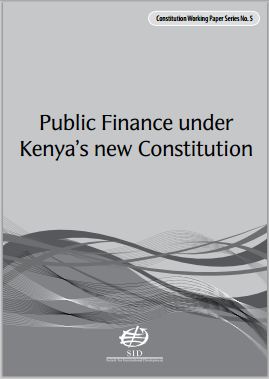Public Finance under Kenya new Constitution
In 2010, on the cusp of Kenya’s new constitutional dispensation, SID embarked on a project called "Thinking, Talking and Informing Kenya’s Democratic Change Framework". Broadly stated, the objective of the project was both historical and contemporary: that is, to reflect on Kenyans struggles for a democratic order through a book project, and to examine the significance of a new constitutional order and its legal and policy imperatives, through a Working Paper Series.
Consequently, SID commissioned research on some of the chapters or aspects of the new constitution that require further policy and legislative intervention, culminating in ten Working Papers. These papers, mostly by Kenyan academics, are intended to help shape public discussions on the constitution and to build a stock of scholarly work on this subject.
Below is an abstract from Working Paper No. 5 "Public Finance under Kenya new Constitution", published by the Society for International Development (SID), Regional Office for East & Southern Africa. The author of this paper is Njeru Kirira.
"Kenya’s new Constitution has introduced fundamental changes in the management of public finance, changes that unfortunately received little attention prior tothe referendum and the subsequent promulgation of the Constitution. Kenyans need to appreciate that public finance affects how power and influence are shared among key players and affects their daily lives. Indeed, Kenyans need to appreciate that in public finance nothing is free. Every benefit must be paid for by somebody, either in the form of taxes or debts. This paper examines the new Constitution and its implications for public finance, particularly the nature of Kenya’s public finance and administration system, the short-comings of the new legal framework and its likely impact in the new Constitutional order. It takes a historical and comparative approach. The paper, through an examination of the experiences of other developing states, makes policy and legislative suggestions on how to remedy the shortcomings of the new system of public finance. The paper argues that all current public finance laws and regulations need to be overhauled, but this should be preceded by legislation on the role of the Treasury and the Parliament. Moreover, Kenya needs to buildnew institutional and administrative structures to manage public finance, and the new Constitution presents this opportunity. However, this is not the time to experiment. Kenya does not need reinvent the wheel. Kenya can learn from the experiences of some developing countries, without carbon-copying their systems."
